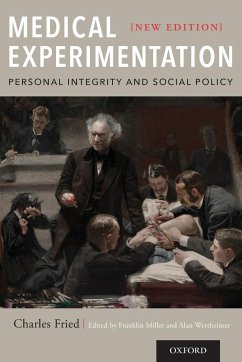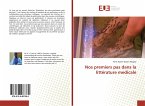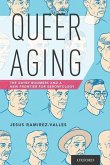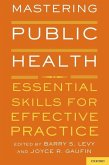- Broschiertes Buch
- Merkliste
- Auf die Merkliste
- Bewerten Bewerten
- Teilen
- Produkt teilen
- Produkterinnerung
- Produkterinnerung
This new edition of Charles Fried's Medical Experimentation includes a general introduction by Franklin Miller and the late Alan Wertheimer, a reprint of the 1974 text, an in-depth analysis by Harvard Law School scholars I. Glenn Cohen and D. James Greiner, and a new essay by Fried reflecting on the original text and how it applies to the contemporary landscape of medicine and medical experimentation.
Andere Kunden interessierten sich auch für
![Experimentation in Man Experimentation in Man]() Experimentation in Man33,99 €
Experimentation in Man33,99 €![Nos premiers pas dans la littérature medicale Nos premiers pas dans la littérature medicale]() René Ayaovi Gayito AdagbaNos premiers pas dans la littérature medicale28,99 €
René Ayaovi Gayito AdagbaNos premiers pas dans la littérature medicale28,99 €![Human Experimentation Human Experimentation]() Ton J. M. CleophasHuman Experimentation41,99 €
Ton J. M. CleophasHuman Experimentation41,99 €![Combining Experimentation and Theory Combining Experimentation and Theory]() Combining Experimentation and Theory116,99 €
Combining Experimentation and Theory116,99 €![Queer Aging Queer Aging]() Jesus Ramirez-VallesQueer Aging51,99 €
Jesus Ramirez-VallesQueer Aging51,99 €![Mastering Public Health Mastering Public Health]() Barry S. LevyMastering Public Health85,99 €
Barry S. LevyMastering Public Health85,99 €![Child Health Child Health]() Alice A KuoChild Health76,99 €
Alice A KuoChild Health76,99 €-
-
-
This new edition of Charles Fried's Medical Experimentation includes a general introduction by Franklin Miller and the late Alan Wertheimer, a reprint of the 1974 text, an in-depth analysis by Harvard Law School scholars I. Glenn Cohen and D. James Greiner, and a new essay by Fried reflecting on the original text and how it applies to the contemporary landscape of medicine and medical experimentation.
Hinweis: Dieser Artikel kann nur an eine deutsche Lieferadresse ausgeliefert werden.
Hinweis: Dieser Artikel kann nur an eine deutsche Lieferadresse ausgeliefert werden.
Produktdetails
- Produktdetails
- Verlag: OUP US
- Seitenzahl: 258
- Erscheinungstermin: 30. Mai 2016
- Englisch
- Abmessung: 210mm x 140mm x 14mm
- Gewicht: 320g
- ISBN-13: 9780190602727
- ISBN-10: 0190602724
- Artikelnr.: 47866380
- Herstellerkennzeichnung
- Libri GmbH
- Europaallee 1
- 36244 Bad Hersfeld
- gpsr@libri.de
- Verlag: OUP US
- Seitenzahl: 258
- Erscheinungstermin: 30. Mai 2016
- Englisch
- Abmessung: 210mm x 140mm x 14mm
- Gewicht: 320g
- ISBN-13: 9780190602727
- ISBN-10: 0190602724
- Artikelnr.: 47866380
- Herstellerkennzeichnung
- Libri GmbH
- Europaallee 1
- 36244 Bad Hersfeld
- gpsr@libri.de
Charles Fried is a full time member of the faculty and Beneficial Professor of Law at Harvard Law School. A former Associate Justice of the Supreme Judicial Court of Massachusetts, he has served on the Harvard Law School faculty since 1961. From 1985-1989 he was Solicitor General of the United States.
* Introduction to the Second Edition-Franklin G. Miller and Alan
Wertheimer
* Chapter 1: Introduction
* Chapter 2: The Legal Context of Medical Experimentation
* 2.1. General principles
* 2.2. Consent
* 2.2.1. The meaning of consent
* 2.2.2. Qualifications of the requirement of informed consent
* 2.2.3. Overriding the patient's failure to consent
* 2.2.4. Withdrawal of consent and the continuing duty to disclose
* 2.3. General legal principles applied to medical experimentation
* 2.3.1. Non-therapeutic experimentation
* 2.3.2. Therapeutic experimentation
* 2.3.3. Mixed therapeutic and non-therapeutic research: The problem of
the RCT
* 2.4. Participation in experimentation as a condition of medical
treatment
* 2.5. Statutes and regulations
* Chapter 3: The Concept of Personal Care
* 3.1. Do randomized clinical trials really pose a dilemma?
* 3.1.1. The burdens on the experimental subject
* 3.1.2. Is personal care a coherent concept?
* 3.1.3. The terms of the conflict: Distributive justice and rights
* 3.2. Distributive justice
* 3.3. The good of personal care
* Chapter 4: Personal Care: Interests or Rights
* 4.1. Economic theory and medical care
* 4.1.1. Efficiency
* 4.1.2. Distribution
* 4.2. The concept of rights
* 4.2.1. Rights and efficiency
* 4.2.2. Negative and positive rights
* 4.3. Personal integrity, the goals of medicine, and rights in
personal care
* 4.3.1. Personal integrity
* 4.3.2. Sickness and death
* 4.3.3. The function of medical care
* 4.3.4. Rights in medical care: lucidity, autonomy, fidelity, humanity
* Chapter 5: Realizing Rights-Medical Care in General
* 5.1. Preliminary speculation: the antinomy of the personal and the
social
* 5.1.1. Political versus ethical theory
* 5.1.2. The theory of democracy
* 5.1.3. What are we entitled to ask of theory?
* 5.2. Two models of the health care system
* 5.2.1. Primary care
* 5.2.2. The hospital
* 5.2.3. The department of health
* 5.3. The antinomy confronted: putting the two models together
* 5.3.1. The rightness of queuing
* 5.3.2. The obligations of bureaucrats
* Chapter 6: The Practice of Experimentation
* 6.1. Some recent RCT's
* 6.1.1. The Veterans' Administration cooperative study group: clinical
trial of anti-hypertensive therapy
* 6.1.2. The university group collaborative oral anti-diabetic agent
randomized clinical trial
* 6.1.3. Coronary by-pass surgery
* 6.1.4. The Salk polio vaccine trial
* 6.2. The concept of professional knowledge
* 6.3. Rights in experimentation
* 6.3.1. Lucidity and the duty of candor
* 6.3.2. Autonomy and the concept of professional accountability
* 6.3.3. Fidelity and humanity
* 6.4. Rights in experimentation implementation and accommodations
* 6.4.1. Alternatives to randomized controlled trials
* 6.4.2. Accommodation by differentiation of role
* 6.4.3. Compensation and participation
* From Medical Experimentation to Non-Medical Experimentation: What Can
and Cannot be Learned from Medicine as to the Ethics of Legal and
Other Non-Medical Experiments?-I. Glenn Cohen and D. James Greiner
* Concluding Reflections-Charles Fried
* Index
Wertheimer
* Chapter 1: Introduction
* Chapter 2: The Legal Context of Medical Experimentation
* 2.1. General principles
* 2.2. Consent
* 2.2.1. The meaning of consent
* 2.2.2. Qualifications of the requirement of informed consent
* 2.2.3. Overriding the patient's failure to consent
* 2.2.4. Withdrawal of consent and the continuing duty to disclose
* 2.3. General legal principles applied to medical experimentation
* 2.3.1. Non-therapeutic experimentation
* 2.3.2. Therapeutic experimentation
* 2.3.3. Mixed therapeutic and non-therapeutic research: The problem of
the RCT
* 2.4. Participation in experimentation as a condition of medical
treatment
* 2.5. Statutes and regulations
* Chapter 3: The Concept of Personal Care
* 3.1. Do randomized clinical trials really pose a dilemma?
* 3.1.1. The burdens on the experimental subject
* 3.1.2. Is personal care a coherent concept?
* 3.1.3. The terms of the conflict: Distributive justice and rights
* 3.2. Distributive justice
* 3.3. The good of personal care
* Chapter 4: Personal Care: Interests or Rights
* 4.1. Economic theory and medical care
* 4.1.1. Efficiency
* 4.1.2. Distribution
* 4.2. The concept of rights
* 4.2.1. Rights and efficiency
* 4.2.2. Negative and positive rights
* 4.3. Personal integrity, the goals of medicine, and rights in
personal care
* 4.3.1. Personal integrity
* 4.3.2. Sickness and death
* 4.3.3. The function of medical care
* 4.3.4. Rights in medical care: lucidity, autonomy, fidelity, humanity
* Chapter 5: Realizing Rights-Medical Care in General
* 5.1. Preliminary speculation: the antinomy of the personal and the
social
* 5.1.1. Political versus ethical theory
* 5.1.2. The theory of democracy
* 5.1.3. What are we entitled to ask of theory?
* 5.2. Two models of the health care system
* 5.2.1. Primary care
* 5.2.2. The hospital
* 5.2.3. The department of health
* 5.3. The antinomy confronted: putting the two models together
* 5.3.1. The rightness of queuing
* 5.3.2. The obligations of bureaucrats
* Chapter 6: The Practice of Experimentation
* 6.1. Some recent RCT's
* 6.1.1. The Veterans' Administration cooperative study group: clinical
trial of anti-hypertensive therapy
* 6.1.2. The university group collaborative oral anti-diabetic agent
randomized clinical trial
* 6.1.3. Coronary by-pass surgery
* 6.1.4. The Salk polio vaccine trial
* 6.2. The concept of professional knowledge
* 6.3. Rights in experimentation
* 6.3.1. Lucidity and the duty of candor
* 6.3.2. Autonomy and the concept of professional accountability
* 6.3.3. Fidelity and humanity
* 6.4. Rights in experimentation implementation and accommodations
* 6.4.1. Alternatives to randomized controlled trials
* 6.4.2. Accommodation by differentiation of role
* 6.4.3. Compensation and participation
* From Medical Experimentation to Non-Medical Experimentation: What Can
and Cannot be Learned from Medicine as to the Ethics of Legal and
Other Non-Medical Experiments?-I. Glenn Cohen and D. James Greiner
* Concluding Reflections-Charles Fried
* Index
* Introduction to the Second Edition-Franklin G. Miller and Alan
Wertheimer
* Chapter 1: Introduction
* Chapter 2: The Legal Context of Medical Experimentation
* 2.1. General principles
* 2.2. Consent
* 2.2.1. The meaning of consent
* 2.2.2. Qualifications of the requirement of informed consent
* 2.2.3. Overriding the patient's failure to consent
* 2.2.4. Withdrawal of consent and the continuing duty to disclose
* 2.3. General legal principles applied to medical experimentation
* 2.3.1. Non-therapeutic experimentation
* 2.3.2. Therapeutic experimentation
* 2.3.3. Mixed therapeutic and non-therapeutic research: The problem of
the RCT
* 2.4. Participation in experimentation as a condition of medical
treatment
* 2.5. Statutes and regulations
* Chapter 3: The Concept of Personal Care
* 3.1. Do randomized clinical trials really pose a dilemma?
* 3.1.1. The burdens on the experimental subject
* 3.1.2. Is personal care a coherent concept?
* 3.1.3. The terms of the conflict: Distributive justice and rights
* 3.2. Distributive justice
* 3.3. The good of personal care
* Chapter 4: Personal Care: Interests or Rights
* 4.1. Economic theory and medical care
* 4.1.1. Efficiency
* 4.1.2. Distribution
* 4.2. The concept of rights
* 4.2.1. Rights and efficiency
* 4.2.2. Negative and positive rights
* 4.3. Personal integrity, the goals of medicine, and rights in
personal care
* 4.3.1. Personal integrity
* 4.3.2. Sickness and death
* 4.3.3. The function of medical care
* 4.3.4. Rights in medical care: lucidity, autonomy, fidelity, humanity
* Chapter 5: Realizing Rights-Medical Care in General
* 5.1. Preliminary speculation: the antinomy of the personal and the
social
* 5.1.1. Political versus ethical theory
* 5.1.2. The theory of democracy
* 5.1.3. What are we entitled to ask of theory?
* 5.2. Two models of the health care system
* 5.2.1. Primary care
* 5.2.2. The hospital
* 5.2.3. The department of health
* 5.3. The antinomy confronted: putting the two models together
* 5.3.1. The rightness of queuing
* 5.3.2. The obligations of bureaucrats
* Chapter 6: The Practice of Experimentation
* 6.1. Some recent RCT's
* 6.1.1. The Veterans' Administration cooperative study group: clinical
trial of anti-hypertensive therapy
* 6.1.2. The university group collaborative oral anti-diabetic agent
randomized clinical trial
* 6.1.3. Coronary by-pass surgery
* 6.1.4. The Salk polio vaccine trial
* 6.2. The concept of professional knowledge
* 6.3. Rights in experimentation
* 6.3.1. Lucidity and the duty of candor
* 6.3.2. Autonomy and the concept of professional accountability
* 6.3.3. Fidelity and humanity
* 6.4. Rights in experimentation implementation and accommodations
* 6.4.1. Alternatives to randomized controlled trials
* 6.4.2. Accommodation by differentiation of role
* 6.4.3. Compensation and participation
* From Medical Experimentation to Non-Medical Experimentation: What Can
and Cannot be Learned from Medicine as to the Ethics of Legal and
Other Non-Medical Experiments?-I. Glenn Cohen and D. James Greiner
* Concluding Reflections-Charles Fried
* Index
Wertheimer
* Chapter 1: Introduction
* Chapter 2: The Legal Context of Medical Experimentation
* 2.1. General principles
* 2.2. Consent
* 2.2.1. The meaning of consent
* 2.2.2. Qualifications of the requirement of informed consent
* 2.2.3. Overriding the patient's failure to consent
* 2.2.4. Withdrawal of consent and the continuing duty to disclose
* 2.3. General legal principles applied to medical experimentation
* 2.3.1. Non-therapeutic experimentation
* 2.3.2. Therapeutic experimentation
* 2.3.3. Mixed therapeutic and non-therapeutic research: The problem of
the RCT
* 2.4. Participation in experimentation as a condition of medical
treatment
* 2.5. Statutes and regulations
* Chapter 3: The Concept of Personal Care
* 3.1. Do randomized clinical trials really pose a dilemma?
* 3.1.1. The burdens on the experimental subject
* 3.1.2. Is personal care a coherent concept?
* 3.1.3. The terms of the conflict: Distributive justice and rights
* 3.2. Distributive justice
* 3.3. The good of personal care
* Chapter 4: Personal Care: Interests or Rights
* 4.1. Economic theory and medical care
* 4.1.1. Efficiency
* 4.1.2. Distribution
* 4.2. The concept of rights
* 4.2.1. Rights and efficiency
* 4.2.2. Negative and positive rights
* 4.3. Personal integrity, the goals of medicine, and rights in
personal care
* 4.3.1. Personal integrity
* 4.3.2. Sickness and death
* 4.3.3. The function of medical care
* 4.3.4. Rights in medical care: lucidity, autonomy, fidelity, humanity
* Chapter 5: Realizing Rights-Medical Care in General
* 5.1. Preliminary speculation: the antinomy of the personal and the
social
* 5.1.1. Political versus ethical theory
* 5.1.2. The theory of democracy
* 5.1.3. What are we entitled to ask of theory?
* 5.2. Two models of the health care system
* 5.2.1. Primary care
* 5.2.2. The hospital
* 5.2.3. The department of health
* 5.3. The antinomy confronted: putting the two models together
* 5.3.1. The rightness of queuing
* 5.3.2. The obligations of bureaucrats
* Chapter 6: The Practice of Experimentation
* 6.1. Some recent RCT's
* 6.1.1. The Veterans' Administration cooperative study group: clinical
trial of anti-hypertensive therapy
* 6.1.2. The university group collaborative oral anti-diabetic agent
randomized clinical trial
* 6.1.3. Coronary by-pass surgery
* 6.1.4. The Salk polio vaccine trial
* 6.2. The concept of professional knowledge
* 6.3. Rights in experimentation
* 6.3.1. Lucidity and the duty of candor
* 6.3.2. Autonomy and the concept of professional accountability
* 6.3.3. Fidelity and humanity
* 6.4. Rights in experimentation implementation and accommodations
* 6.4.1. Alternatives to randomized controlled trials
* 6.4.2. Accommodation by differentiation of role
* 6.4.3. Compensation and participation
* From Medical Experimentation to Non-Medical Experimentation: What Can
and Cannot be Learned from Medicine as to the Ethics of Legal and
Other Non-Medical Experiments?-I. Glenn Cohen and D. James Greiner
* Concluding Reflections-Charles Fried
* Index








